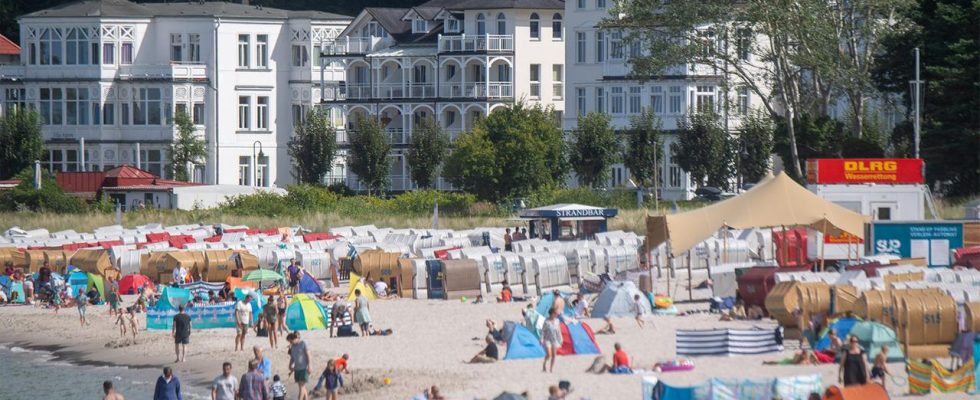background
Hotels, restaurants, entrance fees, beach chairs: prices are also rising in the German holiday hotspots. The service has even gotten worse. The travel industry is on the verge of a radical change.
The Gründler family from Chemnitz wants to go on vacation. The five don’t have high standards. Two weeks in mid-August, a nice holiday home, preferably near the beach – preferably on the Baltic Sea.
They find something suitable on the Internet: three rooms, their own garden, close to the water. The problem: two weeks should cost 4481 euros. “In addition, we have to calculate another one and a half thousand euros for food, petrol and other things,” says father Sascha Gründlers.
A look at the booking portals shows that it has become expensive, especially right on the water. There are only a few bargains left. A house with a sea view for under 4000 euros is hard to find. “It’s awesome for a holiday in Germany. You can hardly afford it,” says Kristin Gründler.
“It’s a tightrope walk”
The high season has just begun in Binz on the island of Rügen. In the IFA holiday park right on the water with 540 rooms, a double room without breakfast now costs 150 euros. Last year it was 125 euros: an increase of 20 percent. This is necessary because of inflation, says hotel manager Thomas Krüger.
“It’s a tightrope walk to find the point up to which the guests go along,” says Krüger. “If you overshoot the mark, you’re on your own.” A family of four simply can no longer afford the prices.
Boom of the Corona years over
In 2020 and 2021, the German seaside resorts experienced a huge rush. Travel abroad was unsafe or impossible because of Corona. And so practically every bed was booked here.
Those days are over. Demand in the pre-season fell by 20 percent in Binz. “All corona restrictions worldwide have fallen,” says Ronald Rambow from the tourist office. “The range of holiday trips has increased again. The guests are spreading out again.”
Spending up 26 percent
Also to where holidays are cheaper. Germany is more expensive than most European destinations. In 2019, before Corona, holidaymakers spent an average of 64 euros per day in Germany. Now it’s 80 euros – an increase of 26 percent. Overall consumer prices have risen by 13 percent during this period.
Despite the inflation: tourism expert Marco Richter from the Dresden University of Applied Sciences has not noticed a slump in demand. “Price consciousness is increasing, but the intensity of travel is not experiencing a slump. That’s what all studies say.” What is happening with the prices is a normalization: “The travel industry does not stand out negatively here compared to other industries.”
skills shortage additional burden
And she is struggling with the shortage of skilled workers. In the IFA holiday park in Binz, the popular beer pub will remain closed this season – there is a lack of staff. The hotel would need 180 employees, there are only 150 this season.
One reason: the bad reputation of the industry. “Underpaid, working nights and evenings, Christmas and New Year’s too, was the tenor. We are now feeling the effects,” says hotel manager Krüger. “If they advertise a job today, they either don’t get an application at all, or the salary expectations are excessive.”
The consequence for the guests: more self-service, shorter opening times, longer queues, more days off. Despite higher prices, less service overall.
Crowds despite higher prices
The high season has also begun on the Zugspitze. Holidaymakers are already queuing in the morning at the Zugspitz train station in Garmisch. Only 4,500 people are allowed up the mountain, and then ticket sales will stop. The rush is great, although the prices have risen. A day ticket now costs 68 euros, seven percent more than last year. Upstairs in Munich, a bratwurst now costs six instead of five euros – an increase of 20 percent.
Just around the corner is the Hotel Alpenhof in Murnau, a four-star establishment. Director Christian Bär has raised the prices in the restaurant in particular, by an average of around 25 percent per dish.
“The energy price, the cost of goods, especially the meat prices are definitely going up,” he says. “We have no other chance than to pass it on. Otherwise there is little left.”
“Insanely nice branch”
The labor shortage is also a problem in Bavaria. 62 percent of the catering establishments here are looking for employees in vain. Across Germany, 21,600 positions are vacant. Hotelier Christian Bär tries to recruit staff abroad, but often has to wait months for visas.
But the industry itself is also to blame. “We have to do more to get employees enthusiastic about us. We have an incredibly beautiful industry, incredibly varied. But we have to teach many people that first. We didn’t have to do that before.”
Is there a rethink?
Industry expert Richter is also observing a change in thinking. “We are experiencing a transformational phase in tourism. Many hoteliers have understood that their employees are their most important resource.”
Hotel director Krüger from Binz is not quite so optimistic about the situation: “We will see more convenience products in the kitchen and more self-service,” he predicts. “Charming service will only be found in a few, very good hotels.”
And the Gründler family from Chemnitz? She goes to the Baltic Sea and gets help with the holiday expenses – from her grandparents.

